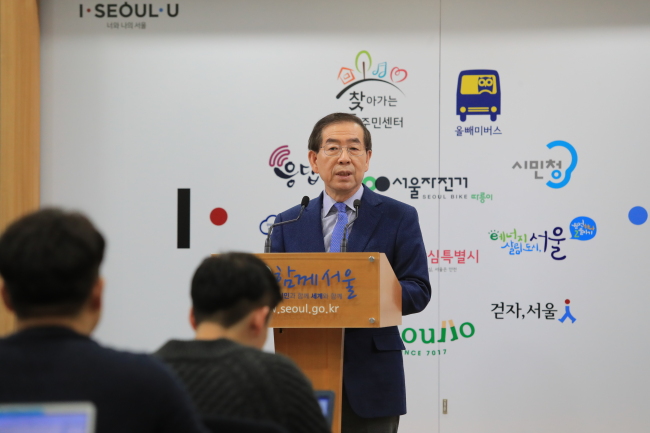‘Alternate no-driving day’ policy to be implemented in Seoul during Olympics
By Bak Se-hwanPublished : Jan. 21, 2018 - 15:48
Amid worsening air quality, the Seoul Metropolitan Government announced proposals for a mandatory “alternate no-driving day” program on days of high particulate matter levels, during which half of vehicles in the city would be banned from using the roads.

Seoul’s Mayor Park Woon-soon said during a Sunday press briefing at Seoul City Hall that, if the plan was improved, the city would activate the mandatory program during the PyeongChang Olympics as well on days when fine dust levels are high.
“PyeongChang has good air quality, but the majority of Olympic athletes, officials and tourists are expected to travel to Seoul as well, making it virtually a second host city,” Park said.
Efforts are underway with the Ministry of Environment to revise the implementation of the Clean Air Conservation Act to allow the city to implement the alternate no-driving day program, according to Park.
“It is the most fundamental right of people to breathe clean air,” Seoul’s Mayor Park Won-soon told reporters, adding that the city would step up efforts to strengthen emergency measures, as well as long-term antipollution policies, to fight dust.
“In the past decade, Seoul carried out policies including replacing local diesel buses (with natural gas vehicles), limiting the use of aged diesel vehicles and providing emission reduction devices for cars to mitigate air pollution and protect citizens’ lives and safety, but we need separate emergency measures amid worsening air quality,” Park said.
The announcement came after the city waived rush-hour bus and subway fares three times last week as part of emergency measures that take effect ultrafine dust levels stay above 50 micrograms per cubic meter for two consecutive days.
Seoul set aside a budget of 24.9 billion won to fund the free public transportation program, which critics say will have only temporary effects at best, as over half of fine dust particles in the country came from China as of 2016, according to the government data.
The ultrafine particulate matter, dust particles less than 2.5 micrometers in diameter, is classified as harmful by the World Health Organization, causing a wide range of respiratory illnesses.
Park’s announcement came just as Nam Kyung-pil, the governor of Seoul’s surrounding Gyeonggi Province, renewed his criticism of Seoul city’s policies.
In a message posted on his Facebook page on Sunday, Nam called on the national government to draw up measures to improve air quality, and accused Seoul City of “wasting of taxpayers’ money” with its recent measures.
“Fine dust is becoming a national disaster,” Nam wrote, adding that Seoul city cannot deal with the issue by itself.
“The matter of fine dust must be dealt with at a national level, and local governments must cooperate with (national) government policies.”
Nam went on to call on President Moon Jae-in to establish a presidential organization to deal with the matter, and to include the issue in South Korea-China summit diplomacy.
“Seoul city government’s free public transport (program) wastes 5 billion won in taxes a day. (Park) should not blame Incheon and Gyeonggi governments while wasting taxes,” Nam wrote, referring to Seoul’s free public transportation policy.
Last week, Nam refused Seoul’s proposal to implement the free public transportation program together to reduce car use, citing associated costs. Currently, the three metropolitan areas -- Seoul, Gyeonggi and Incheon -- mandate alternate no-driving programs for government-owned organizations and services when the air is bad, but not for private vehicles.
By Bak Se-hwan (sh@heraldcorp.com)








![[Graphic News] More Koreans say they plan long-distance trips this year](http://res.heraldm.com/phpwas/restmb_idxmake.php?idx=644&simg=/content/image/2024/04/17/20240417050828_0.gif&u=)
![[KH Explains] Hyundai's full hybrid edge to pay off amid slow transition to pure EVs](http://res.heraldm.com/phpwas/restmb_idxmake.php?idx=644&simg=/content/image/2024/04/18/20240418050645_0.jpg&u=20240419100350)







![[KH Explains] Hyundai's full hybrid edge to pay off amid slow transition to pure EVs](http://res.heraldm.com/phpwas/restmb_idxmake.php?idx=652&simg=/content/image/2024/04/18/20240418050645_0.jpg&u=20240419100350)

![[Today’s K-pop] Illit drops debut single remix](http://res.heraldm.com/phpwas/restmb_idxmake.php?idx=642&simg=/content/image/2024/04/19/20240419050612_0.jpg&u=)